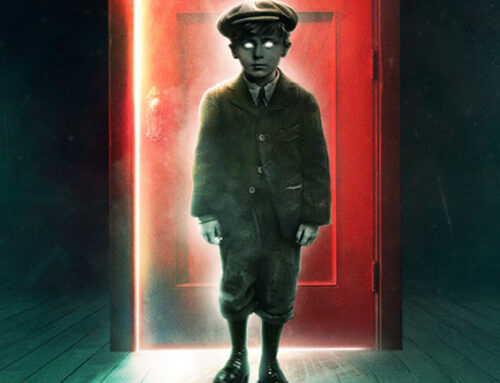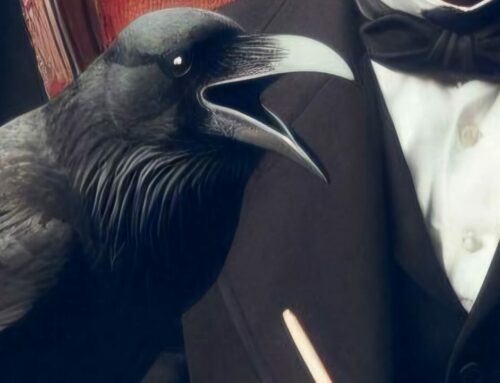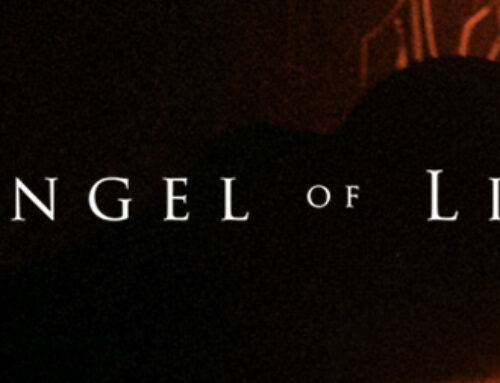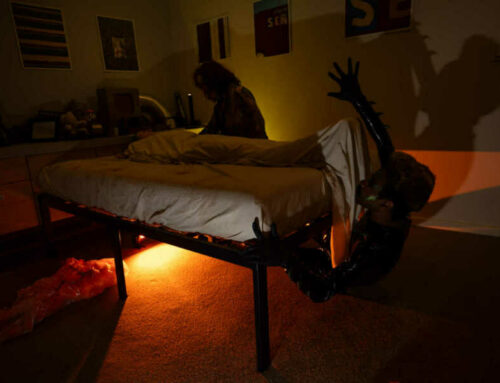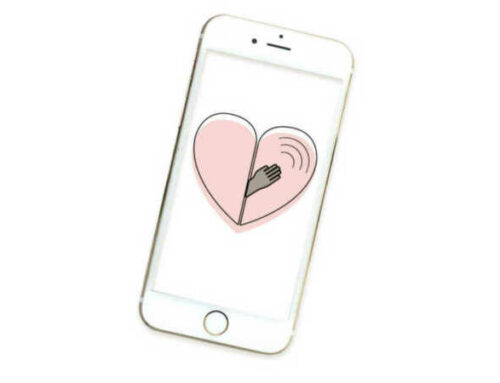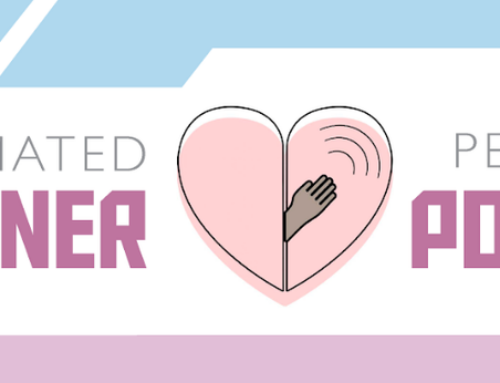In high school, I hung out with a guy who people would sometimes refer to as “Columbine.” There was no real reason for this; it was just that he had somewhat unwashed hair, an unusual music taste, and—most importantly—wore a dark trench-coat. My partner has a similar story. So does my college roommate. And a few more people I know. Indeed, for a certain generation, it seems that at some point, it became trendy to casually refer to those fitting a certain style as school shooters. It is this sort of phenomenon that DON’T GO TO SCHOOL TOMORROW tackles; what does it do to a person to be typecast into the very worst of humanity?
The sophomore effort of Twin Knives Productions (LOVELOCKED), DON’T GO TO SCHOOL TOMORROW is a 24-hour remote immersive experience focusing on disillusioned teenaged duo Mark and Harrison—creators Melody Phillips and Eli Magyor, respectively—and their newly long-distance friend, Gene (Joshua Simon). Their story plays out over Discord chat, supplemented by video vignettes and an audio track finale (Dillan Bergman stepping in as Mark for these elements). As participants, the audience is invited to temporarily and anonymously step back into their high-school selves, optionally plugging in to a voice channel at any time during the experience to listen to a corresponding playlist which one participant referred to as “immaculate.”
The most unexpected part of DGTST, though not an unwelcome one, was the tone. For the majority of the experience, things felt rebellious in a way that was playful, even joyous. The servers were full of solidarity in our angst and resentment toward a world that had gotten us down, and I thought in earnest several times that these were people I’d easily spend summer nights complaining alongside in some abandoned parking lot.
I was surprised—and a bit disturbed—by how easy it was for all of us to take on the personalities of high-schoolers once more, someone always up for discussing fears of crippling student debt or difficult family expectations… or else, for making up demeaning nicknames for each other, telling dead baby jokes, or wondering aloud if there was anything good coming in our futures. The interactions were ongoing and natural, and the actors perceptive enough to never be disruptive, weaving their characters in with the audience conversation seamlessly.
The spark of the audience dynamic was to no small part a compliment to the creators. In an experience like this where audience interactions are essential, much of the credit goes to the recruitment and selection process. Twin Knives’ branding and marketing for the show (some of which featured original music by Magyor) clearly did its job of attracting the right people, and the interview process—which largely aimed to fully inform potential participants of what content they might encounter in this experience—no doubt further refined and prepared the list.
To be sure, Phillips and Magyor have no fear of pushing the limit. Phillips and I spoke on the phone of mutual desires to better understand people on all ends of this situation, and the show reflected her empathy—nothing ever seemed exploitative or like it was making light of tragedy—but it’s certainly a difficult subject matter and one bound to be distasteful to some. To some extent, however, I wonder if they pushed it quite enough. The interview process, ever-conscious of the wide possibilities of audience conversation, warned of the potential of encountering violent, offensive, and even threatening content.
Very little, however, ever escalated above the sort of thing you might hear a 12-year-old say on Xbox Live. While neo-Nazi regalia did come up, even then were characters quick to clarify they only appreciated the aesthetic. Though I’m personally glad the actors may have struggled to take things to their hateful peak, what I thought might be a sort of character study on young men at the very end of the radicalization process truthfully presented little in terms of the horrendous rhetoric frequently found online after such atrocities have been committed. Mark and Harrison are, in their own ways, each quite lovable—but perhaps this is part of the point. The thesis of DON’T GO TO SCHOOL TOMORROW seems to be that this could be any of us, if pushed too far. I’m not well-versed enough in the psychology of these situations to know if that’s entirely true, but I found myself simultaneously wishing I had the information I needed to understand how the hell these boys got here and realizing that there was no situation in which I ever truly would.
DON’T GO TO SCHOOL TOMORROW is generous towards its audience, allowing them to respond to the fantasies of these young men as they so choose and opening the door to one-on-one conversations without forcing them. Characters were distinct and felt fully-formed, Mark an endearingly confused misfit who’s always been on the losing end of life and Harrison a sharp-talking leader, understandably suspicious of strangers.
I got the impression that the actors would have known how to respond to any possible occurrence without ever breaking character or threatening the suspension of disbelief. The video portions, aided by the actors’ real-life friendship, seemed so authentic that their clearly not being high-schoolers never even crossed my mind (though the particular combination of sound-quality and casual annunciation didn’t play so well with my admittedly cheap headphones). The final audio was well-produced and gave an impression of a full, expansive, and organic scene, leaving me with the complicated emotions the end of a good immersive event can offer.
A stand-out of the show was Joshua Simon’s Gene, in many ways the only character to undergo a full arc over the course of the production—by the time we meet the leads, they’re so close to the end of their story that there isn’t time left for any big epiphany or revelation. That 24-hour real-time format was one of the biggest draws to the production for me. Ultimately, however, I don’t believe it served the story. Going into the show already knowing the outcome cut down what tension could have been present in trying to stop these men, and there simply wasn’t enough time for the anticipation and hope for other possibilities to build. What story did exist was paced well over the course of the show, but I can’t help but wonder what all of us would have done with a few more days.
I wasn’t sure what I would experience with DGTST. I thought I might feel terror, hatred, sympathy. In the end, I was just deeply sad for my new friend, Mark: the circumstances that brought him to this point, the ones that made him feel he couldn’t turn around, and the knowledge that he’d certainly be lost, too. I suppose that was the problem. By the time I met him, he already was.
DON’T GO TO SCHOOL TOMORROW is a bold concept that shows off the acting and audience-management skills of its creators. A duo of risk-takers with a clear creative partnership, Twin Knives Productions shows an abundance of promise as to the range and uniqueness of stories they’ll come to tell.
For more information on Twin Knife Productions, please visit them online at: https://www.instagram.com/twinknifeproductions/



